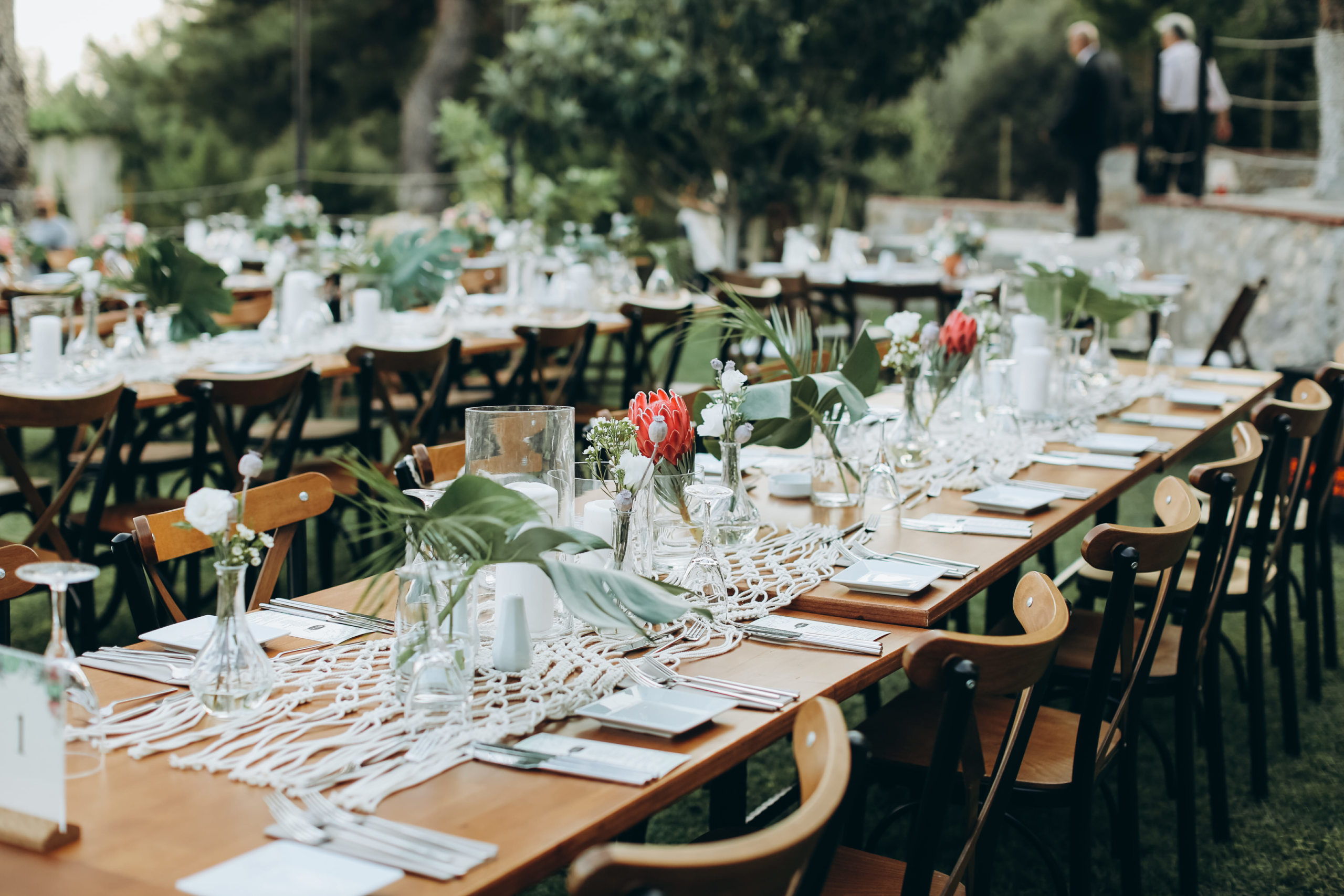Weddings can be expensive – no ifs, ands, or buts about it. But the price tag can cause additional sticker shock if you’re not prepared for all the hidden costs.
Hidden Wedding Costs
To help you plan a realistic wedding budget, we’re lifting the veil on the unexpected costs that often pop up on the journey to the big day.
1. Transportation
One overlooked – and potentially budget-busting – wedding expense is transportation. According to WeddingWire’s 2019 Wedding Report, the average cost for wedding transportation is $1,050.
There are many considerations to keep in mind as you’re planning your transportation budget. For example:
- Do you and your partner plan to travel by limo or another type of vehicle?
- Are you staying far from your wedding venue? If so, how will you get there?
- Do you need transportation for your wedding party or immediate family members?
- Does your venue have a parking lot for your guests or will you need to rent a bus or other vehicle?
- Do you want to provide food and beverages in the vehicles?
- How many vehicles do you need?
- How long do you need the vehicles?
- How does distance affect the cost?
How to save: With so many moving parts, transportation might be low on your priority list. Avoid waiting until the last minute to book (it’s common!) and try to set up your service three months in advance.
2. Hair and makeup
According to WeddingWire’s 2019 Wedding Report, hair and makeup costs around $650 on average. The wild cards that can blow up hair and makeup costs include more detailed services like false eyelashes, airbrushing, or intricate hairstyles, and whether you’re paying for these services for family members or your wedding party.

Here are some things to think about as you plan your wedding day hair and makeup budget:
- Do you want a blowout or an intricate updo?
- How many people in your bridal party, or immediate families, will need hair, makeup, or both?
- Where are your top stylist options located? How far is that from your venue?
- Will you pay for part, or all, of the bridal party’s styling?
- Do you want your stylist to stick around to touch up your hair and makeup?
How to save: If your stylist works out of a salon or their home, but you want them onsite, you’ll likely pay travel costs. There’s often a minimum amount for service providers to travel, so ask about minimums and overtime charges.
3. Non-venue-approved vendors
Did you know that some venues restrict which vendors they’ll work with to create your big day? It’s nothing personal. Venues may have contracts with a few select florists, table and rental companies, or even specific DJs and bands. The Knot says a venue with an approved list of vendors will usually charge a 20% fee or higher if you hire outside the list.
Questions to ask your venue and potential vendors:
- Do you have a list of approved or recommended vendors?
- Are there limitations to using outside vendors?
- Where is your vendor located, and how far is that from your venue?
- If an approved vendor doesn’t offer what you need or isn’t available, do you have options?
- What’s the venue’s full list of fees related to using outside vendors?
How to save: Always read the fine print and avoid selecting vendors that don’t work with your venue if there is an upcharge.
4. Cocktail hour and snacks
Cocktail hour usually comes before the reception, giving the guests something to do while the wedding party is taking photos. But it comes at a price, depending on what you’re serving, how many bartenders you have, and how long you plan to serve drinks.

Cocktail hour costs can get out of hand if you pay per drink. If you wrongly estimate your guests to be light drinkers, but they imbibe heavily, be ready to pay up – just know that a flat fee might end up being less cost-effective if your guests aren’t big drinkers.
Some couples want to treat their guests to a late-night snack or treat. This can also eat into your budget.
Questions to ask as you plan your cocktail hour and snacks budget:
- How many guests will be there?
- Do you want passed hors d’oeuvres or unmanned food stations?
- How much do you want to allocate to each guest?
- Are there fees for bartenders?
- How much alcohol do you anticipate your guests to drink?
How to save: Skip the late-night snacks. There is enough food and alcohol served at the reception that most people are content after the cake is served.
5. Food tastings, cake tastings, and other vendor trials
It’s a good idea to test out food, cake, and vendors, but many vendors charge for trial runs – even if you don’t end up using them for your wedding. If it takes you a few tries to find the right fit, those costs add up.
As you plan for tastings and trials, ask these questions:
- Can you get a free tasting before signing a contract?
- If not, how much does a tasting or trial cost?
- Will the tasting be included for free if you end up signing a contract?
How to save: Limit your tastings and trials to only a handful of vendors you’ve thoroughly researched and vetted. Shop around a bit to see who offers the best deals.
6. Open bar
While your guests may love getting as many drinks as they’d like, the endless pour is expensive. The average bar service starts at $15 per person, according to WeddingWire’s Wedding Catering Cost Guide.
An open bar can be a truly hidden cost because what you spend comes down to how many people you have at your wedding, the variety of liquor or drinks you offer, and how long you keep the bar open.
Questions to ask as you consider the bar budget:
- How long do you want to keep an open bar? For instance, is it two hours or the whole night?
- Can you limit the open bar to certain types of alcohol to curb costs?
- Could you offer a cash bar instead, where guests pay for their own drinks – even for part of the night?
- Will a flat fee be a better deal than paying per drink, or vice versa?
- Will your venue refund you, or credit you, for any liquor that goes unused?
How to save: Consider only serving beer and wine since those are less expensive than cocktail drinks. If you’re buying the ingredients yourself, check if your liquor store will buy back the unopened bottles.
7. Taxes, tips, and service fees
You might not even realize the extra cost you’re paying for taxes, tips, and services until you get the final bill.
Consider things like tips for transportation, bartenders, coat check, valet, and hair and makeup. And your venue might charge cake cutting and serving fees, corkage fees, and more.
Things to ask each vendor to help you budget for taxes, tips, and service fees:
- Are tips and fees included in the initial costs – or are they additional?
- What’s the full cost, including taxes?
- What could cause the price to go up, and what fees are charged if you accidentally break or exceed your contract?
How to save: Carefully review the fine print of your contracts – and ask for a clear breakdown of all costs from your venue and each vendor.
8. Overtime fees
Venues that specialize in weddings have schedules to keep. That means venues will lose money if you aren’t out when you’re supposed to be. If you go over your time, you could pay overtime fees – which can be $250 per hour or more, according to The Knot. You can also be charged overtime fees by your wedding photographer, DJ, transportation service, and others.
Things to consider to help you avoid going over budget because of overtime fees:
- How much time is needed for setting up, breaking down, and cleaning up?
- Can guests be directed to another location so everyone can be out of the venue on time?
- Exactly how much will the venue or vendor charge for overtime?
- Can you negotiate a lower overtime rate beforehand – just in case?
How to save: Take a careful look at how much time you’ll really need – and ask your vendors how much time they need, too. Add buffer time to your contract. Whether you’re considering clean-up time for yourself or the venue crew, avoid overtime fees by making sure people don’t linger. If you have an after-party venue or plan, inform your guests and put someone in charge of shooing stragglers along.
9. Attire and accessories
The average wedding dress cost is around $1,700, and tuxedos are $500, according to WeddingWire’s 2019 Wedding Report. And that’s not including related costs for dress fittings, alterations, steaming and cleaning, and other appointments.

Things to think about when budgeting for your attire:
- How many fittings will I need?
- Is the cost of all fittings included in the price?
- If not, how much extra will I need to pay for fittings and any alterations?
- What accessories do I plan to borrow versus purchase?
How to save: You might find the perfect dress or tux in the unlikeliest of places. Think thrift stores, vintage shops, trunk shows, or sample sales. Consider asking relatives if they have something you could wear. Find your wedding day attire early and make alterations as needed with a trustworthy tailor or clothing alterations specialist.
10. Welcome bags and wedding favors
Welcome bags and wedding favors are fun things you might want to give your guests for coming to your wedding. You might have a blast designing a one-of-a-kind koozie or flasks with your wedding date on them, but they can put a hole in your budget. Couples spend around $450 for favors at their wedding, according to WeddingWire’s 2019 Wedding Report.
If your heart is set on sending your guests home with mementos, keep these things in mind for your budget:
- Do the favors require additional packaging or accessories that will add more to the cost than you initially budgeted?
- Are the favors so cheap your guests probably won’t keep them anyway?
- Will going the DIY route actually save you money?
How to save: Your friends and family are attending your wedding to celebrate you and your partner. Find inexpensive ways to show your appreciation, like cookies or candy. Be sure to visit each guest at the reception to thank them for coming, especially your out-of-town guests. Sincere acknowledgment and a handwritten note go much further than a seed packet or a custom soap.
11. Paper products
From the moment you say “yes” to that proposal, you’ll be ready to shout it from the rooftops – and print it on paper. Lots of paper. Everything from engagement announcements and save the dates to wedding invites, seating cards, and thank-you cards. And don’t forget the postage! According to the WeddingWire’s report, invitations and stationary ate up about $550, so make sure you’ve budgeted enough.
Here are some questions to ask to help you figure out how much paper you might need – and see how it fits with your budget:
- How many announcements will you send? Will you send a save the date as well as an invitation?
- Can you use an electronic invitation for some wedding-related gatherings – like for showers, bachelor and bachelorette parties, and, if you’re having one, the day-after brunch?
- Can you allow guests to RSVP by email and create a web page for maps, directions, and other important wedding details?
How to save: Limit your paper products to the necessities. Instead of sending out multiple announcements, send only the wedding invites and thank-you cards. Skip seating cards and allow guests to sit wherever they want. Or put up a single board with everyone’s table number listed. Look at invitation packages or bundles to get a discount for buying multiple paper elements at once. Consider using electronic invitations.
12. Equipment rentals
Not all venues offer everything you need when you book with them. Average event rentals is $650, according to WeddingWire’s Wedding Rentals Cost Guide. That means you’re on your own for things like tables, chairs, and other equipment. Not only do you have to pay to rent the goods, but you’re also on the hook for transportation and set-up fees to get them to and from your venue.
Things to consider when budgeting for equipment rental costs:
- Do you need to rent everything, including chairs, tables, and lighting, or does the venue offer these items?
- Are items for an outdoor wedding venue, like a tent and heaters, included?
- What is the full cost – including transportation and labor fees?
- If you pay for certain equipment that doesn’t end up being used, will you still have to pay for it? Does your venue have a contingency plan?
How to save: Get what’s included in the quote in writing. What’s the extra cost of adding equipment? If your venue uses a third party for equipment rentals, see if you can find another third-party option that’s less expensive.
13. Clean-up and breakdown fees
You might find these fees rolled into your venue contract as part of your agreed-upon price or as a separate line item. Either way, you pay the price to have someone else clean up from your party. While not all venues charge these fees, many include it as standard so you don’t have to stress about cleaning up on your wedding day.
Consider these questions to help you budget for cleaning and breakdown fees:
- Are the costs rolled into your rental fee or are they additional?
- Can the costs increase under certain circumstances?
- Can you negotiate the costs or find other ways to save?
How to save: If you don’t mind cleaning up from your own party, find a venue that allows you to set up, breakdown, and clean up yourself (as long as you’re not staying past your allotted time). If you don’t want to address the mess yourself, ask each potential venue about clean-up fees and see if you can negotiate them to a price you’re comfortable with.
14. Hotel rooms
If you’re getting married in a hotel or a venue next to a hotel, you’ll probably use a hotel room to prep for your big day. Some hotels will offer a discount on a room or even a few rooms when you book your wedding venue there, but it’s not guaranteed. Sometimes you might not realize you have to pay the added cost for the room when you book your venue.
When planning your hotel room budget, don’t forget to ask:
- How many rooms do you need?
- Can you get a better deal at a nearby hotel? If so, can you use that price to negotiate a better deal with your hotel venue?
How to save: See what packages your hotel venue offers to get a good deal on a hotel room. You might not think getting a hotel room is necessary, but not having one may create more of a hassle on the big day. If it’s really not a big deal, find a venue that has wedding party rooms to get ready in without booking a hotel room.
15. Marriage license
Before the ceremony, you’ll need some paperwork. And that, too, will cost you. Marriage license fees range from $10 to $115 depending on the state, county, and other factors.
Some states charge higher fees under certain conditions. Indiana, for example, charges $60 for out-of-state applicants, but its usual marriage license fee is $18. And some counties in Idaho charge $20 extra if you’re applying on a Saturday.
Plan ahead so you can save money, or at least plan for higher marriage license fees if they exist, by asking:
- Are there ways to save money on the marriage license fee?
- Are there higher costs under certain circumstances?
How to save: There’s no escaping the cost of a marriage license, so you might as well make sure you’re financially prepared for it and add it to your budget. Some states and counties offer discounts if you take a pre-marital counseling course, so it might be worth looking into.
The Bottom Line: How To Deal With Hidden Wedding Expenses
Not all wedding costs are front and center. Stay above water by assuming that surprise costs will arise and budget for them ahead of time. Put a line item (or two) in your budget for “unexpected costs” from the start.
It’s better to over budget and have money left for honeymoon splurges than to be blindsided and in debt when you get married. Another good way to help pay for future surprises is to have a solid cash back credit card or travel rewards card available. So if you do pay for unexpected things, at least you’ll reap those rewards points. Just remember to pay your bill in full every month and manage your debt wisely.



